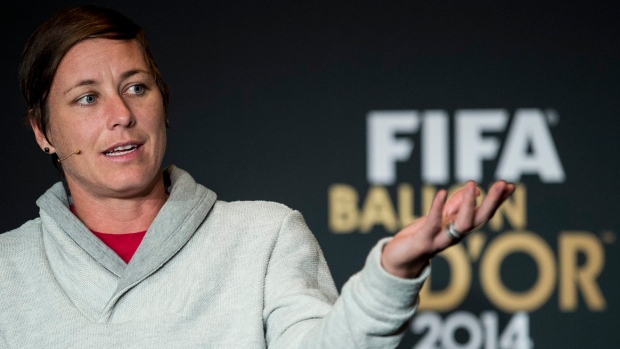Jan 21, 2015
Players drop Women's World Cup turf discrimination case
A group of women's soccer players have abandoned their gender discrimination lawsuit in Toronto against FIFA and the Canadian Soccer Association over their plans to play the 2015 Women's World Cup on artificial turf. The complaint was withdrawn Wednesday morning with the Human Rights Tribunal of Ontario, TSN has confirmed, five months before the June 6-July 5 competition. The tournament will be held in Ottawa, Vancouver, Edmonton, Winnipeg, Moncton and Montreal.

A group of women's soccer players have abandoned their gender discrimination lawsuit in Toronto against FIFA and the Canadian Soccer Association over their plans to play the 2015 Women's World Cup on artificial turf.
The complaint was withdrawn Wednesday morning with the Human Rights Tribunal of Ontario, TSN has confirmed, five months before the June 6-July 5 competition. The tournament will be held in Ottawa, Vancouver, Edmonton, Winnipeg, Moncton and Montreal.
The complainants had included Abby Wambach of the U.S. and Germany's Nadine Angerer, FIFA players of the year for 2012 and 2013, respectively.
"On behalf of the players, I want to thank all who aided our fight for natural grass fields at the 2015 World Cup including our volunteer lawyers from Canada and the United States," Wambach wrote in a statement. "Our legal action has ended. But I am hopeful that the players' willingness to contest the unequal playing fields – and the tremendous public support we received during the effort – marks the start of even greater activism to ensure fair treatment when it comes to women's sports."
The players who filed the complaint charged FIFA is discriminating against women by having the tournament on artificial turf since the 2014 FIFA World Cup for men in Brazil was played on grass. Some professional football leagues, including Major League Soccer and some FIFA World Cup qualifying matches, are played on artificial turf.
Canada won the right to host the 2015 Games when the only other finalist, Zimbabwe, withdrew from consideration.
"FIFA and CSA... will fail to host a discrimination-free tournament. They have embarrassed themselves and provided further grounds for reformers to challenge their current leadership," Hampton Dellinger, a lawyer for the complainants, wrote in a statement.
Dellinger wrote that FIFA and the CSA have threatened protesting players with suspension, delayed a final court ruling on the matter, and rejected a settlement offer.
"The players' united, international effort to protest discrimination has had a positive impact," Dellinger wrote. "The deplorable artificial surface at BC Place, the site of the final, will be replaced. Goal-line technology will be used for the first time in a women's World Cup and we know that the 2019 World Cup will be held on grass. Moreover, the players and their supporters have highlighted continuing gender inequity in sports and lessened the chance that such wrongdoing will occur in the future."
Soccer officials have said natural grass surfaces aren't practical because some of the stadiums used for the World Cup are also scheduled to be used next summer for preseason and regular season Canadian Football League games. It's tough to ensure a grass field is in good shape for soccer the day after a football game, the officials have said.
No Canadian women were among the complainants because some worried about what the CSA might do after the fact, Dellinger said.
